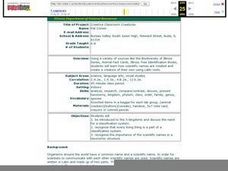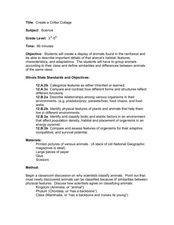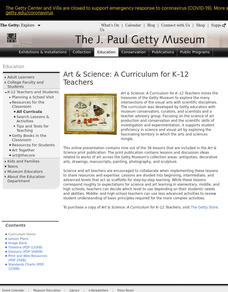Curated OER
Creative Classroom Creatures
Students are introduced to the five kingdoms and discover why there is a need for a classification system. Using the internet, they examine how scientific names are created and practice putting animals into their correct classification....
National Science Teachers Association
Hop into Action
Young scientists find out what makes amphibians such unique and interesting animals in this simple life science lesson. After looking at pictures and discussing the characteristics of amphibians, learners complete a series...
Curated OER
Animals and Habitats of the Chesapeake Bay
Students work in small groups to discover the various habitats present in Chesapeake Bay and the animals that live in them. After investigating the habits and lives of the animals they will draw conclusions about other habitats the...
Curated OER
Animal Classification
Third graders differentiate between vertebrates and invertebrates, and identify the main characteristics of mammals, fish, reptiles, amphibians, and birds. They sort and categorize different types of balls, discuss the characteristics...
Curated OER
Animal Classification
Pupils watch video and slide shows as an introduction to animals. They discuss classifications of animals while moving from most common to least common of the animals. Types of classifications includes herbivores/carnivores;...
Curated OER
Animal Kingdom Game
Students build their vocabulary and communication skills by describing animals found in nature. In this ESL lesson, students play a board game to compare and contrast animals. Students respond to icons, pictures and words to strengthen...
Curated OER
Animal Classification
Second graders identify characteristics of and group animals by the five categories of vertebrates.
Curated OER
Animals Around the World
Students study different kinds of animals and what group they belong to. In this animal classification lesson students view different animals and sort them by what group they belong to, for example a snake is in the reptile...
Curated OER
Classification 1: Classification Scheme
Students examine how many kinds of living things can be sorted into groups in many ways using various features to decide which things belong to which group and that classification schemes vary with purpose.
Curated OER
Classifying Commercial Marine Species
Students investigate taxonomy. They explore some of the commercial marine species caught in Magdalena Bay and develop a classification system for presented animals.
Curated OER
What's Your Genus? Scientific Classification and the VT
Students understand the definition of binomial nomenclature. For this binomial nomenclature lesson, students classify ordinary animals by seeking their scientific names. Students participate in a knowledge hunt using binomial nomenclature.
Curated OER
The Five Classes of Vertebrates
What a terrific lesson plan! Learners discuss the animal kingdom, and classify them as vertebrates and invertebrates. They also identify them as fish, amphibians, reptiles, birds, and mammals. There is even a taxonomic breakdown of...
University of Wisconsin
Bimodel Botany Bouquet
Gardeners are given an individual plant specimen from a bouquet of local rain garden plants. They group up by their plant type and then make observations together, name the plant, and introduce it to the rest of the class. You then share...
Curated OER
Who's Got Game? The Lion or the Mouse?
Discuss bullying, folk tales, and more using this resource. Learners read the story The Lion and the Mouse by Toni and Slade Morrison, engage in cause and effect activities, make predictions, and discuss bullying. This is a motivating...
Captain Planet Foundation
Which Plant Is Which?
Learn about dichotomous keys, plant identification, and how to care for the planet with a lesson plan that includes several hands-on and innovative activities. Kids go on a plant scavenger hunt and classify the plants that they find...
Curated OER
Big Cat Classification
First graders discover the different names and classifications of big cats by using word processing applications. In this animal life lesson, 1st graders investigate one big cat and create a database of facts about it using an word...
Curated OER
Biology In Elementary Schools
Students classify animals into six major animal groups and describe the characteristics of the animals found within each group. In this living and non-living animals lesson, students observe a variety of animals, both living and...
Curated OER
Classifying Vertebrates
Second graders study animal characteristics and classification. For this animal characteristics and classifications lesson, 2nd graders determine how to classify vertebrates which include mammals, reptiles, amphibians, birds, and fish....
Curated OER
Create a Critter Collage
Young scholars create a collage. In this animal classification lesson plan, students discuss why and how scientists classify animals. Young scholars view pictures of different animals and decide which class each animal belongs to....
Curated OER
Clearly Classified
Young scholars review the classification system for living organisms and apply it the classification of insects and flowers in the still life by Ambrosius Bosschaert. They create a chart classifying the animals and plants in the painting...
Curated OER
The Kingdoms
Students review the various categories in taxonomy. In groups, they identify the characteristics of each kingdom and compare and contrast them. They define the terms binomial nomenclature and morphology. To end the activity, they...
Curated OER
Invertebrates
Students examine invertebrates. In this animal classification lesson, students discuss invertebrates and bilateral symmetry. They discuss the importance of horse shoe crabs in medical science.
Curated OER
What Animals Need to Live
Fourth graders read "Habitat: What Animals Need to Live" then create a Venn diagram for herbivore, omnivore, and carnivore. In this animal survival lesson, 4th graders determine where different animals need to live depending on what they...
Curated OER
Animal Classification
Young scholars classify animals. In this animal classification lesson, students identify characteristics from each of the 5 categories of vertebrates. Young scholars group animals by categories.























